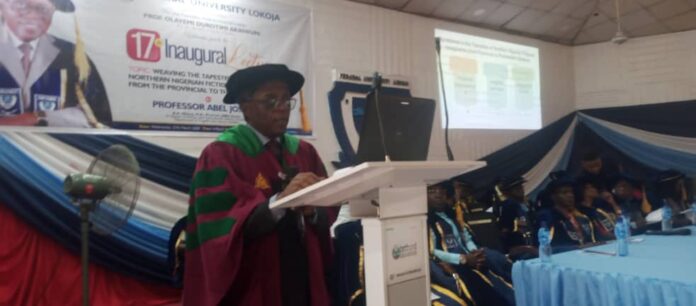By Odimayo Olatunde Fredrick
A Professor of African and Post colonial Literary studies Department of English and Literary studies Prof. Abel Joseph has called for the establishment of a centre for Nigeria Cultural studies in Federal University Lokoja that would midwife a project to canonize Northern Nigeria writers.
Prof. Abel made the call on Wednesday at the 17th Inaugural lecture on the topic ‘Weaving the tapestry of northern Nigeria fictional imaginaries from the provincial to the pluriversal’ held at the University campus in Adankolo Lokoja, Kogi State.
The University Don noted that, through this, the University can live up to the general and statutory expectation of a centre of learning aware of and vibrantly responding to emerging ideational values and their nuances for research, pedagogy, and innovation.
In this, Prof Abel asserted that, in this centre, scholars can research on significant historical and archaeological aspects of Nigeria’s fast disappearing cultural ethos.
Continuing, the Professor of African and Post colonial Literary studies said “I will further secure for Federal University Lokoja that capacity for knowledge production and the possible canonisation of same in much the same instances that, for example, Universities of fbadan, Laces, Nigeria (Nsukka), Benin, Obafemi Awolowo, have succeeded in canonising Nigerian writers like Achebe, Clark, Soyinka, Okigbo, es Okpewho, Osundare, lyayi, Ojaide, and a host of others.
“It would help rein in other gifted but neglected Nigerian Writers from within the immediate valance of central Nigeria and beyond. In becoming a center of excellence inclusive of and beyond the studies in Northern Nigerian literature, the University will be remarked as a nurturer of skilled cultural and social ambassador impacting on the general spiritual and intellectual scape of the community, which shall naturally ensure the noble cross-cutting dialogue between town and gown and vice- versa.”
He identified translation initiative, library festival and events, digital platform and online presence, collaboration and partnership, education and literary programmes, author residence and exchange, media engagement, support for literary infrastructure, as some of the strategies for fostering international appreciation of Northern Literature.
“What is expected of any novelist with a pronounced sense of history is to make the past present, to bring the distant near. Accordingly, Northern Nigerian fictional Imaginaries in English have woven their way from the provincial to signify, interrogate history, colonial legacies, power relations, hegemony as well as the continuing interlacing and overlapping of cultures which define the texture and the tradition of the Novel in post colonial Nigeria.
“Therefore, the frontiers of the Nigerian Novel have been further expanded because the development introduces issues, themes, and experiences which highlight the commonality of Nigeria’s predicament.
“Before now, it was almost as if northern Nigeria existed in an isolationist space, and was deliberately resisting ‘assimilation’ into Nigerian literature in English expression. However, there has been a surge in literary and creative output from younger generation of northern Nigerians whose works now mark an embrace of a culture of ‘cosmopolitan urbanity’ as the literature now explores all aspects of life in Nigeria.”
“These young writers are also exploring the impact of Islam on cultural diversity and are revealing a variant of social and cultural developments which the novels from other regions have not explored. Accordingly, scholars like Sani Abba Alryu (1988, 1993), Oba Abduraheem (1990), Abdalla Ubah Adama (2003, 2005), Abel Joseph (2005), Richard Ugbede Ali (2009) and many others are stirring up conversations on creative works written within secular liberal tradition and which have drawn on several traditions to transcend the provincial peculiarity to participate in the discourse on national development and global post colonial contexts.
“It is interesting that in spite of its lack of concern with ‘national issues’, the northern Nigerian fictional imaginaries have in recent years knitted significant national politics into their art. These works now also embody and signify certain phenomena that are peculiar to the North but have extended to issues of such of feudal hegemony and power relation, elite formation, and the gender relations and representations, especially in the says in which these relations are negotiated within post colonial Nigeria.
“The pluriversal essence in literature to me signifies a broader acknowledgment of the value of all human experiences and a celebration of the rich cocktail of cultures that make up our global society. The submission here is that the Northern Nigerian fictional imaginaries have emerged and integrated into the larger canon of Nigerian fictional narrative in very significant ways especially in terms of the novels’ ‘interrogation of issues of post colonial social and political experience such as governance and responsibility, poverty, marginalization, urbanization aad globalization; issues that are well beyond parochial, regional or Proviacial interests”.
Prof Joseph acknowledged the place of literature in shaping cultural understanding of humanity.
According to him “STEM is important but is not superior to humanistic discourses as she alone does not define life.
“Like all other spheres, Science is also shaped by the political, religious, social and economic considerations/interests. There is no grant or funding for scientific researches that are offered without these considerations because, these grants and funds are deliberately channeled to support or help particular political, economic or religious goals.
” I would suggest for the encouragement that all Science related courses in the University have at least a course in literature for deeper understanding of the pluriversal nature of humanity.
“Pluriversal literature holds significant importance in the context of the new post-human reality, which encompasses the evolving relationship between humans, technology, and the environment.
“Pluriversal literature holds significant importance in the context of the new post human reality, where advances in technology, shifting identities, and inter-connected global experiences are shaping the way we understand ourselves and our world.
“Pluriversal literature is relevant and valuable in thes evolving landscape: in this new reality, literature allows readers to engage with characters who navigate both physical and virtual worlds, reflecting the emergent post human condition”he stated.
End




